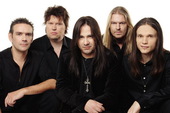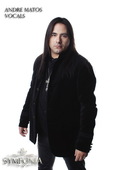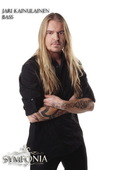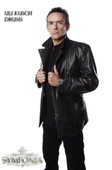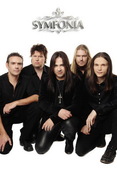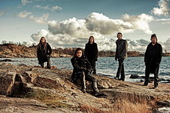Symfonia
Pilgrim Road
08.04.2011
Архив интервью | Русская версияEverything that Finnish guitar extraordinaire Timo Tolkki does ends up as breaking news. Just a while ago the metal world was surprised once again by his decision to dissolve his project Revolution Renaissance – even before the band released its final album on a new label. But now Timo is back in the news again with a new band called Symfonia and a new album, “In Paradisum”, coming out on yet another new label. Even more surprising is the fact that Symfonia is fronted by Brazilian singer Andre Matos, whom we interviewed a few years ago, and who seemed to be pretty happy being on his own and pursuing a solo career. Now we got together with Andre once again to find out how these two very different people from two parts of the world got together, how they put together “In Paradisum”, and what are they going to do with their lives next…
A couple of years ago you visited Russia for the first time with Tobias Sammet’s Avantasia. What are your impressions about the country and about the show you played?
Actually I was very well impressed. I had always tried before to make it to Russia with my previous bands, but it was only possible with Avantasia. This whole Avantasia tour was very well planned, there was a very good atmosphere. It was a very special moment to play in Moscow and to visit Russia for the first time. I was very impressed with everything in the country and I really enjoyed it.
In general, how was it like touring with Avantasia? We guess it must be a very different experience when you don’t sing the whole show, but only appear on stage for a few tracks?
That is quite relaxing, I must say. When you sing the whole show yourself, you have to bear responsibility, and when you don’t sing the whole show, when you’re more like a guest, you can enjoy the show itself better. I was pretty much watching the show from the backstage and already following the whole sequence of songs, and when you go onstage, you have to give it full power. Sometimes you get very anxious, because your song is not there yet, and you wanna come in, but on the other hand, you can also enjoy what’s going on with the other singers onstage. With Avantasia it was like in a real team, and we really enjoyed to be working together.
In an interview we did in late 2007 we asked you about the reasons why you stopped living in Germany and moved back to Brazil, and you said winters are too cold in Germany. Now you are living in Sweden, where winters are even colder than in Germany – what made you relocate so far to the north?
Maybe the winters here are not as cold as in Russia! (everybody laughs) Not many regions can beat Siberia in this sense, maybe only Alaska or Greenland. I was happy that I was in Russia in the summer. As to Sweden, I moved here for personal reasons, I married to a Swedish girl, and it was more for the family thing that I actually decided to come. It happened almost two years ago, and that’s maybe the reason why the whole thing with Timo Tolkki started - he’s in Finland. One day I got a phone call from Timo who said, “Hey, I know that you’re living in Sweden, which is just round the corner from me. Why don’t we meet and try to write some stuff together?” That’s how the whole idea of Symphonia started.
What was your first reaction when Timo Tolkki invited you to join his new band? Did you take time to think it over, or did you go for it immediately?
Basically there was not even any thought about it. I’ve known Timo for 13 years, we toured together in Europe in the times of Angra and Stratovarius, and he’s been a good friend ever since. When he invited me to do something together, I didn’t really have anything to think about. He’s one of the few musicians in this musical scene that I really admire, I really enjoy what he does. Our ways of thinking about the world, our points of view have a lot in common, I share a lot of his opinions. It was just a pleasure in the first moment to get together and write some songs without any compromise. We didn’t know what would come out of this, in the beginning it was meant to be just a project, something we do together and maybe hire other musicians, but soon it started to take a different shape. These other guys, very well known guys, joined the band, and it stopped to be just a project and started to be a real band.
Over the past few years Timo Tolkki has had a very controversial media image, the press and his former bandmates describe him as a very difficult person who often changes his mind. Was it easy for you to find a common language with Timo on the musical side?
Absolutely! What I have to say about this is – of course, everybody has personal problems, and Timo somehow made these problems of his own pretty much exposed on the media. That might have confused the people a little bit. But on my side, what I have to say is that Timo is one of the nicest and sweetest persons I’ve ever met in the scene, and we have zero problems together. We spent a lot of time during this production talking about other subjects than music, and basically we understand each other pretty well. We became even closer friends after this production.
How much did you contribute as a songwriter to the first Symfonia album? In his previous bands Timo basically wrote 95% of music and lyrics…
In Symfonia it’s 50/50, Timo and I wrote all of the songs on this album in partnership, regardless that in one or another song I wrote more or he wrote more. We just put it all together and helped each other with our own ideas. It was pretty much of teamwork of the two of us, there is input from both of us. We did it for convenience reasons, because it was hard to get the other members together in a preproduction fashion, so to say, but it does not mean that on the next album, for instance, the other members will not be contributing with some composing ideas. I think that would be cool. Nevertheless, they already contributed a lot to these songs with their performance and their arrangements. In the beginning there were very simple arrangements, the songs existed as demos, and in the end they turned out the way they sound now. That was really impressive as well. Basically we are very fine with this system of working, everything was very easy-going and very fluent.
The band name Symfonia and the album title “In Paradisum” – who came up with them, and is there any special meaning in them?
This was up to the mastermind, Timo Tolkki. In the beginning, when we were still thinking about the project, he came to me and said, “I have a name for it, and I already have a logo for this name”. He’s a hard worker. When you think about something, he’s already done it. He presented this to me, and I said, “Well, it looks very good and sounds very good. I have nothing to say against it, it’s fine with me”. It was one problem less to discuss. I think this name is cool, because when you hear it and when you see the logo, you already know to expect from the music. That was our main compromise – by doing this thing together, we don’t want to create something new, we don’t want to reinvent any kind of musical style, unlike to what we’ve done in the past. My solo stuff, for instance, is way more experimental. But for Symfonia the idea was just, “Let’s get together, let’s get the best out of us, and see what comes out”. And that’s actually what on the record.
In the past you have written such songs as “Lisbon” and “Rio”, and there’s a special story behind each of them. On the album “In Paradisum” you have the song “Santiago” – how did you come up with it?
But this song is not about the city of Santiago! It’s about the saint called Santiago. The very city in Spain, Santiago de Compostela, a pilgrimage center, was built around the story of this saint. Santiago is also known as St. James. The story says that St. James was one of the apostles of Chirst, whose bones were taken from Jerusalem to Spain and buried at the very place where the cathedral of Santiago de Compostela stands today. This song has the same subject as another song on this album, the one called “Pilgrim Road”. One song is a sort of continuation of the other one, and they are about the search for spiritual revelation while being on a pilgrim road, getting in touch with your own self, and seeing the truth regardless of the troubles you had before. I think both songs make a kind of positive input.
What is the current situation with the drummer in Symfonia? How is Uli Kusch feeling at the moment?
Uli Kusch is pretty much in the same situation, which is very sad for us. We had our debut show at the Finnish Metal Expo in mid-February, and Uli was not able to play there. He has some really bad injury in his hand nerves, he’s still searching around for the best treatment, and we still don’t know if he’s gonna get operated or not. That was really disappointing for us, because he did such a great job on the album, and we were looking forward to have him onstage for this first show. We’ll see how the situation is when we start a real tour. I hope he can be recovered by then.
What are your impressions about that first show?
That was quite challenging, because I know that the Finnish audience is not the easiest one to be conquered, and we had this problem with Uli on top, so we needed to find a replacement for him. But we were very lucky in this regard, because we found a very good drummer called Alex Landenburg, he’s also from Germany. He was replacing Jorg Michael on the last Stratovarius tour, so he’s pretty much familiar with this musical style, and he’s very good, very clever and a very nice person, so we got along pretty well. It was the perfect solution. In the end, we missed Uli there, but the show was perfect, because we had a great drummer playing with us. We had a lot of fun. I have to say I was a little worried about this first appearance, it was the first time we really gathered on stage, but I could see that the songs really worked out, and even though I had thought the Finnish audience was hard to conquer, in the end they were very receptive and screaming for more. We couldn’t play more, because we didn’t rehearse any extra songs, but it was already very nice that they wanted more, and this left a very good impression on us.
What was your reaction when bootleg videos of the show appeared on the Internet already the next day?
I actually expected it. Nowadays you count on it, and you already sit there and search for them. (laughs) I thank the people who did it, because it’s it cool to see the record of what you did the night before. It’s not a problem.
We have noticed two Stratovarius songs (“Dreamspace”, “Stratosphere”) in the setlist of that show. Why did you perform these particular tracks – do they mean something special for Timo?
We came to the conclusion that we should play most of the songs off the album. I mean, this particular concert was not a very long one, it was a 60-minute show. So for most of the show we played new songs from the album, completely unreleased so far, and it was a kind of new thing for the audience, they’d never heard this before. And to make it a little more comfortable for the listeners, we also decided two or three songs from the past. But we don’t wanna be a cover band of ourselves, we don’t wanna live off our past, so we decided that we’re not gonna play the most famous songs of Stratovarius, Angra or our solo careers. I had another big concern – I don’t wanna sing the Timo Kotipelto stuff. I have a lot of respect for him, and he’s my friend as well, and I don’t feel like getting into his stuff. Therefore we chose some of early Stratovarius stuff when Timo Tolkki was the singer, and we also performed an Angra song that was never played live, it’s called “Lasting Child”. It was a great experience to do that. We pretty much go for the B-sides and not rely on “the best” from our past. We really believe in the new songs, and it’s just a matter of time for people to get used to them. We have a good chance that they will become new metal anthems too.
At the moment Symfonia has announced no tour dates and we don’t know much about the band’s future plans. What is the band going to do after the release of the album? And how much of your time are you going to devote to Symfonia? Would you call it your full-time band?
It’s a full time band as long as there are activities related to it. Obviously I’m not very able to run two things at the same time, but of course, my solo band is still sitting in Brazil, we are still planning things for the future – for sure! It’s just a matter of arranging schedules. Whenever there is a recording or a tour with one or another band, I will be fully dedicated to that. When there is some break in between, I can switch over to another work and dedicate myself to that. The commitment is pretty much the same, but of course, you have to establish priorities depending on the period that you’re working with one or another thing. As for the Symfonia tour, it is planned to start in June, but actually it was planned to start from Japan, and now we are forced to change this plan because of the tragedy that happened in Japan. In fact, next week we were supposed to be in Japan to do some promo, and that has been cancelled, too, because right now it’s absolutely unthinkable to do something like that in that country. We are very worried and very sorry about them. As soon as this tour is rescheduled, we will have the dates on the webpage.
Are you satisfied with what you have achieved as a solo artist? Do you think the two albums you did have been really heard and appreciated by the people, or do you think the band could have become bigger?
That’s a difficult thing to answer. Probably I’m not the right person to think about it. I just do my music, I just do what I think and what I feel. In my opinion, we have done it very rightly so far. Some stuff in the music scene, regardless if it’s metal, classic or whatever, is appreciated many years after it’s released. I remember when Angra released the album “Holy Land” (1996), it was so much criticized at first. Especially in our home country, Brazil, it was not well accepted, we saw a lot of criticism. And ten years later most of the people say, “It was the best Angra album ever!” It’s hard to predict what opinion of the people is gonna be in the future. But for sure I wouldn’t have changed anything in what I have done, I’m very satisfied with all the results so far. What really matters to me is the musical input that you have and the message that you pass along, and whether it is commercial enough or not, it’s not up to me, this is more the job of the record labels, promoters and whoever else.
“Mentalize” (2009) is quite different from “Time To Be Free” (2007), and actually every new album you do is different from the one before. What are the factors that influence your music? Do your musical tastes change? Does the music reflect changes in your personal life or environment?
It’s all together, I would say. Like I told you, with Symfonia we didn’t have this pretension, to do something extremely experimental, fresh or new. We just wanted to have it good and let the best out of us, and this is something really good about this band. But if we’re talking about my solo stuff, I set this task for myself – every time I need to make a step further whether it’s gonna be well understood or not. It’s very important for me not to be repeating formulas, to in bring some fresh stuff, to renovate somehow, to show that it’s possible to innovate and come up with something that you cannot really shape or control. That’s the way I have been working so far, and I think there is progress across my career that you can easily see. Whether you like the new stuff or the older stuff, it doesn’t matter, it all belongs to one longer career, and I’m pretty much satisfied with the chapters of this book so far.
You recorded “Time To Be Free” with Roy Z as a producer, and on “Mentalize” you worked with Sascha Paeth. Can you compare these two producers? How much are their working methods different?
They have different points of view and different ways of working, but in the end, they have the same passion for music. They are both great guitar players and great composers and great persons. (laughs) It’s been very easy to work with both of them. It’s very good for me to have this range of nice producers available. And now I have Timo Tolkki, the third one, which turned out a great producer as well. I co-produce my own work most of the time, but I really like to work with somebody else, to have a second hand there, second eyes and ears open, because when you’re doing music, it’s very important to exchange ideas and feelings, otherwise you can easily get lost in your own mind. This has always been very important for me.
What is the meaning of the cover artwork for “Mentalize”? Why did you decide not to put your name or album title on it and only have two letters “AM”?
I think “AM” is a symbol, a monicker for the Andre Matos band, so to say. And I wanted something really different and infectious on the “Mentalize” cover. That cover is very unusual and very symbolic at the same time. It depicts a labyrinth, which is taken from the Middle Ages. The same labyrinth lies on the floor of one of the biggest medieval cathedrals in France, the Chartres Cathedral, and it’s a very symbolic figure, it’s very spiritual as well. Of course, in all of my works I’m inclined to the spiritual side – I don’t mean religious, spiritual is something else, it’s the search for answers to some deep and philosophical questions - the cover of “Mentalize” also reflects the quest for the truth, the quest for one’s reality as a human being.
You mentioned the song “Lasting Child” which you performed with Symfonia at Finnish Metal Expo. And for “Mentalize” you re-recorded an even more obscure Angra track, “Don’t Despair”. Why did you decide to give a second life to them?
These songs were put into obscurity somehow, and I think it’s unfair. (laughs) I think they deserve a second chance. In Symfonia it’s very clear – like I said, we don’t wanna live off our past, we’re going for the B-sides, and it’s also more fun to ourselves. Regarding “Don’t Despair”, this is a song that was never recorded on an actual Angra album, it was a demo song. We always tried to put it in any of our previous albums with Angra, but for some reason it was always left aside. That’s basically the reason why we finally recorded it on a real album. It was a song written by myself, so I felt it was time to bring it back to life.
Another bonus song on “Mentalize” is “Teo Torriate”, which is a cover version of Queen. Everybody knows you are influenced by Queen, but what was the reason behind choosing this particular track?
That was a bonus track for the Japanese edition, and half of the song is sung in the Japanese language. That’s something we did specially for Japan. Once we were thinking about what we could do as a bonus track for Japan, we didn’t want to compose any song specifically, and it was my guitar player Hugo Mariutti who came up with this idea. And it was a great idea! I never would dare to cover a Queen song, except for live performances or something like that – because of my big respect for Queen, but in this particular case, when we needed a bonus track for Japan, and this song is half in Japanese, so we decided to give it a try, and it turned out very good. I feel very good about it.
How was it like singing in the Japanese language?
Well, I had to basically learn the sounds. (laughs) Of course, I know the translation of the lyrics, but I’m not good at Japanese, I can say just a couple of sentences. It’s just too many languages to learn. (laughs) Right now I’m going into my seventh language with Swedish, but I still need to learn things like Japanese, Russian and Greek. (everybody laughs) Who knows, if there is some time left over in the rest of my life… I absolutely love languages, to learn a new language is something that really excites me.
For three years already you have doing shows in Brazil with chamber orchestra Ulbra where orchestral arrangements of rock classics are performed. Can you say a few words about these events?
Oh, these are some of the greatest experiences I’ve ever had. There are such good musicians, and the conductor guy is such an open-minded person! I was invited as a guest, and they even performed some songs of mine apart from the rock classics. That was one of the experiences I had with an orchestra, another one was also in Brazil. It was a young orchestra playing a full concert with my solo band, they also did a kind of tribute, they did classical arrangements for many songs of my career, and it was very touching. Another experience I had was when I played the main part in the “Tommy” rock musical. It was also with an orchestra, and it sounded so powerful and so good! I belong to both worlds, because I was trained as a classical musician in the first place, and I have the same passion for rock and classical music. Every time I can be among classical musicians and orchestras, I’m feeling very happy!
On the other hand, a couple of years ago you appeared on an album by Dutch project HDK, which is probably the heaviest record you have ever participated in. How did you get involved in this project? Are you interested in extreme metal genres?
I like it! I like some heavier stuff, of course I do. I listen to anything as long as it’s good and original. This guy, former After Forever guitar player Sander Gommans, I met him in Germany when I was recording the “Time To Be Free” album. We were basically working at the same studio, he was doing other stuff there, and I was doing my stuff. He’s such a great guy. He said, “Look, I have this project, maybe you could sing a song for me?” I said, “Why not? Let’s give it a try!” I got him to sing some backing vocals on my album as well, he did some very aggressive stuff, and I really needed this kind of voice. Basically we exchanged favors. It’s always an honor to cooperate with talented people like him.
The heavy metal scene today is in a strange situation – on the one hand, music is very accessible, there are so many ways you can get new and old music, but on the other hand, we have a feeling that the audience does not really care for music that much anymore. In your opinion, what will happen to rock and metal in the next few years?
I think, from all musical styles, probably our style is the one that suffers the least from these market changes, although it suffers as well. Of course, in the past it was a completely different picture, if you go back about 15 years ago. The bands could make a big income from record sales, record labels could do so as well, and you would tour whenever you felt like touring. Nowadays everybody’s forced to tour all the time, and the touring scene is overcrowded, so there’s a big competition for gigs, for places to play. It’s very tough nowadays, because the only way to survive in the musical scene is to play live. On the other hand, if there’s somebody who’s been selling records, it’s the metal bands, because we have an audience mainly made of collectors. The people who listen to this kind of music are not really satisfied with just downloading and having only mp3 files. I say for myself, I don’t like this format and I’ve never liked it, because I come from the vinyl times, and whoever experienced vinyl records knows what we’re talking about.
For us the main problem is that it’s getting too easy to get too much music. Now you don’t have to make any efforts to get anything new or anything old that you want to have, and because of that people don’t seem to be interested that much…
You know, some days ago I read an interview with Jon Bon Jovi, and he said something very interesting. He said nowadays the problem is that people don’t have the experience of a full album anymore. They take it in bits, they take it in pieces. People go for the singles, people don’t go for an album anymore. They don’t buy an album because the cover artwork looks great, this is disappearing somehow. He said probably in the future this generation will look back and say, “What happened to us? Why was this possibility taken away from us?” And I think everything is very cyclical. I don’t think the album format is gonna die. It’s now a period of new discoveries, new experiences and new technologies, but something is still important. If you read a book, you’re not gonna download every chapter separately and read them in random order. It’s just important to realize that this piece of art like a book or a record or an exhibition of paintings belongs together. The record experience is something that we have to insist on, because it makes sense. Otherwise we could release a track every week, and that would be pretty much it if we don’t need to make an album. But there is a reason why these songs are set together into one album, and that’s the most important thing that we have to keep for the future.
Let’s hope that this format really survives…
Yeah, because it’s a better experience. We already lost a lot when vinyls were replaced by CDs. We lost in sound quality, and we lost in the experience itself, because it was a different thing to get a vinyl record with its big cover and find all the details on this cover, even manipulate the record – feel the texture, feel the smell, put it into the player, listen to the needle. That was a complete experience somehow. Because of the vinyl you had to put it there, sit down and listen to the music. You didn’t have a portable turntable which you could bring along with you or put in a car. (laughs) We usually bought cassette tapes for that purpose, but the sound there was not as good. After the arrival of CDs, CD players and Walkmen this experience was already beginning to change. Half of the nice experiences from the records was already gone. And then when they invented this mp3 which cuts the sound up and down and is like a bizarre haircut for the sound (laughs), for the ones who really like music and like to listen to the details this is almost monstrous. But I understand this is very practical. The other day I was buying a stereo for my car, and I found out that they almost don’t even make stereos with CD players anymore. You have to buy a stereo with an mp3 player, memory card or something like that. The new format is taking over. But somehow the old format is still there. The funny thing is that if you look at the record sales of today and for five years ago, you’ll see that they have increased. These things are happening at the same time, and we hope that the old format will not die.
Let’s finish at this optimistic note. To round off this interview, can you say a few words to your audience in Russia? Is there a chance to see you here in some not so distant future?
As I said, the Symfonia tour should start in Asia in June, but we do have plans to play in Russia. That’s now up to our booking agent, he’s searching for the available dates. You will for surely see us again there, and I’m already looking forward to perform once again in Russia. Now with Symfonia it’s gonna be not so relaxed (laughs) as with Avantasia. I will sing the whole show, and the songs are not so easy, but I’m very excited about bringing this news to all of you and getting the chance to be in Russia one more time.
Symfonia on the Internet: http://www.symfonia.fi
Special thanks to Maxim Bylkin (Soyuz Music) for arranging this interview
Roman Patrashov, Natalie “Snakeheart” Patrashova
March 18, 2011
© HeadBanger.ru
